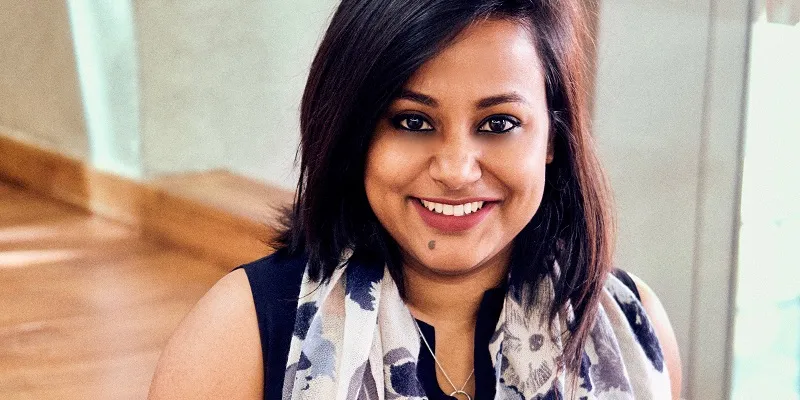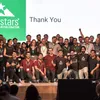From co-working space to accelerator: how The CoWrks Foundry promotes 18 startups across three cohorts
This programme for entrepreneurs is designed by experts from UC Berkeley, Stanford and Harvard University, and industry veterans. Support has also been received from Columbia, Yale, and Brown University. From urban works to e-health, startups have a lot to gain from this accelerator in Bengaluru.
[This article is part of Startup Hatch, the YourStory series on incubators, accelerators, makerspaces and co-working spaces in the startup ecosystem. See earlier profiles of initiatives at IIT Bombay, IIM Bangalore, BITS Pilani, NCL, Tata Elxsi, Axilor, NID, Vellore Institute of Technology, Makers Asylum, NetApp Excellerator, Pitney Bowes Accelerator, TechStars, Indigram Labs, WeWork, Sandbox Startups, Brigade REAP, Target India Accelerator, Zone Startups, Maersk, Anthill Studio, UnternehmerTUM, AZO, EXIST, InsurTech Hub Munich, and Ashoka Innovators.]

Nruthya Madappa
Nruthya Madappa is the Managing Partner of The CoWrks Foundry. Her passion is in technology and scalable solutions for emerging markets. She was earlier Head of Business Development and Strategy at Cuemath, Product Manager at TeachAIDS, and Senior Associate at Keystone Strategy. She graduated from Harvard Business School and Stanford University.
Nruthya joins us in this chat on the vision of the coworking space and accelerator, challenges facing Indian founders, cohort profiles by sector, international partnerships, and success factors for founders.
Edited excerpts below:
YourStory: What was the founding vision of your accelerator, and how is it supported?
Nruthya Madappa: The CoWrks Foundry was established with the vision to forge resilient and unsinkable companies.
Silicon Valley and countries like Israel, China and Singapore have garnered the support of the government, private investors, and accelerators, and have therefore created ecosystems where startups thrive. Despite a tangible surge in India’s startup community, businesses in the urban tech, enterprise tech, and social enterprise space in particular face unique challenges.
With the rapid expansion of cities, the urban tech sector has ample opportunities to create solutions to leverage this growth but is constrained by high barriers to entry and inaccessibility to qualified industry experts.
The enterprise tech front is confronted with a lack of exposure to global mills, and product and design frameworks. As a result, there lies a huge untapped global market and these startups remain confined to local geographies.
Startups in the area of social enterprise are built with the intention to maximise social impact but their business models do not focus on sustainable growth, leaving this sector severely underfunded and without the ability to attract private sector interest.
Aside from these sector-specific setbacks, there is a range of other issues that plague these high-potential industries. To begin with, there is a dearth of quality industry knowledge. The content of the curriculum provided lacks depth and is rarely crafted by experienced industry veterans. The quality and consistency of mentorship are detached and irregular.
Additionally, entrepreneurs are faced with the dual task of selling to and educating investors, who are unaware of the intricacies of the industry. The CoWrks Foundry addresses all of these bottlenecks by providing unparalleled supervision and support to early-stage startups.
YS: How does this fit into your plans and operations of the co-working space?
NM: CoWrks was established with the vision of creating an entrepreneurial ecosystem - the perfect office space, a network, and partnerships.
The idea of The CoWrks Foundry was forged to strengthen this vision. It is the missing link between entrepreneurs and the right mentorship in the ecosystem and creates a symbiotic ecosystem within the CoWrks community.
A cycle of startups, SMBs/SMEs, and large enterprises feed off of each other. The companies at The CoWrks Foundry could help the companies in the community, and the industry veterans in the community guide these startups.
With CoWrks, early-stage entrepreneurs can leverage the large network of corporations and enterprises within all our centres. We can support India’s thriving startup ecosystem by providing them with the space, educational resources, mentorships, and connecting them with the rest of the world through our global network.
YS: How many cohorts have you had, and which startups have graduated from your accelerator so far?
NM: In the past ten months, The CoWrks Foundry, as a part of its core programme, has invested in 18 companies across three cohorts. In our Core Programme Cohort 1, four companies graduated in December 2018.
UnderstandBetter, founded by Pankaj Harita and Swaathi Kakarla, helps companies manage people intelligently with an AI-powered HR solution that provides customised, contextual solutions for employee engagement. With the ability to grasp the context and adapt to situations, UnderstandBetter addresses broad-based human resource needs. The platform continually monitors and evaluates employee sentiment through contextual questions tailored to each employee. This is, in turn, converted into retention mapping and engagement insights.
Ayasta, founded by Ravi Teja Avasarala, Saideep Reddy Kandakatla and Raghu Kumar Manchukonda, combines sensors, ML, and computer vision. It ascertains deterioration, and predicts faults and impending risk within a facility and in the external electrical grid. Relevant, timely information and a comprehensive library of signatures help to prevent failures, reduce downtime, and eliminate the need for intermediaries.
Betterly, founded by Lakshmi Sreenivasan and Sandeep Malhotra, is an anonymous, personalised and economical tech-enabled platform to address mental health issues. Certified professional counsellors and psychotherapists interact with users through text, audio, and chat. With over a hundred users, the data gathered helps to build a smart platform that can deliver improved mental health care.
T-Scale Hub, founded by Nagalapuram Harshvardhan and Pravasith Kumar, is an online marketplace for architects and vendors. Firms or individuals can review the work of desirable candidates by paying a subscription fee, and vendors can advertise their products and services to the architecture community, generating additional revenue.
The second Core Programme Cohort 2 has eight companies as part of the ongoing programme. The Urban Works Innovation Challenge Cohort 1 has six companies that graduated in May 2019. Five of them are Indian startups and the sixth is a student team from Columbia School of Engineering.
ValetEZ, founded by Prashant Chandrasekaran and Smit Kant Raturi, is a smart parking and mobility solution. It builds and operates a mobile, cloud and IoT-based parking management system to digitise and organise parking infrastructure.
Synapptra, founded by Anil Bhatnagar, Vikram Yadav and Dheeraj Batra, has developed a hybrid edge computing device that provides predictive intelligence for improving the performance of workplace assets. It aims to reduce energy costs and wastage by 30 percent and improve air quality through efficient control and management of heating, ventilation, air conditioning, and lighting in buildings.
Suchitha, founded by Shyam Sasidhara and Momy Saikia, has designed a bio-waste processing technology that offers a decentralised waste management solution and can convert wet waste into organic manure in just a few hours. The solution aims to address the problem of waste that is produced on a daily basis, thus reducing the need for disposal and transport of waste. Furthermore, the organic manure produced from recycled waste will create a source of income and help foster organic farming.
Hexpressions, founded by Abhimanyu Singh and Shilpi Dua, has created a new construction material and process involving composite-paper honeycomb panels. By applying this to wall spaces, furniture systems, and other workspace infrastructure, the company aims to promote green buildings that are not only sustainable but also durable, soundproof, affordable, fast, flexible, and modular. The use of honeycomb panels can help reduce the world’s carbon footprint by reducing the dependency on damaging construction materials.
Indra, founded by Krunal Patel and Amrit Om Nayak, focusses on the treatment of wastewater and the purification of industrial and chemical effluents by using advanced automation and analytics.
BinIt, the Columbia student team led by Raghav Mecheri and Ajit Akole, has developed a recycling station that uses elements of machine learning as well as mechanical sorting to sort out waste. It eliminates the need for humans to decide what to put where in recycling bins.
We launched applications for Cohort 2.0 in December 2018 and completed the selection process in February. Companies in the portfolio include Ayasta, Huviair, and Betterly. Companies like Ayasta (Cohort 1) and Huviair (Cohort 2) work with enterprises to use their data more intelligently, thereby minimising inefficiencies, improving safety, and enabling businesses to focus on their vision of transforming urban development.
Focussing on the people that drive successful businesses, Betterly (Cohort 1) aims to build a high-performing and resilient workforce by providing employees with access to mental health care solutions through a tech-enabled platform.
YS: Which startups are currently being accelerated?
NM: The following companies are a part of Cohort 2.0 of the Core Programme.
Instoried, founded by Sharmin Ali and Anit Bhandari, is an AI-based augmented writing tool optimising emotions in content to evaluate writing standards. It is now also going vernacular. With about 100,000 users, it is adopted by content marketers in BFSI, FMCG, and travel industries.
Huviair Technologies, founded by Arjun Janananda and Vikshut Mundkur, offers drone data analytics software for enterprises. The company refines custom unmanned aircraft service and software solutions for survey and workflow management.
Bhorzvan Motors, founded by Nishant Kalbhor and Rohan Shravan, is an EV platform providing high performance customisable electric motors, motor controllers, battery management systems, and related electronics.
Lockn Technologies, founded by Tharun Reddy Chinthala and Krishna Teja, has developed SIMSIM, which is a hardware and software infrastructure for homeowners to manage their property and remotely grant access to visiting guests.
BotSpace, founded by Bilal Chaglani and Mayur More, is a B2B platform that lets businesses deploy end-to-end chat solutions to automate customer service without coding, training, or bot deployment knowledge. The company has pre-designed conversational templates that can be deployed within seconds.
Yogya, founded by Sugam Malviya and Agam Malviya, provides an online corporate learning platform with self-paced mobile-friendly courses. The courses include interactive content and gamification. They provide job-oriented skills with specific curated learning paths for the employees.
HappyLocate, founded by Ajay Tiwari and Sainadh Duvvuru, is a one-stop solution for end-to-end employee relocation services. With over 25 relocation partners, HappyLocate also takes care of service delivery through the partners.
YS: What are the selection criteria for startups in your accelerator?
NM: We look for formidable founding teams, innovative and disruptive ideas, product-market fit, and scalable product and technology stack.
Founding team: The founding team should consist of not more than three capable, driven, and self-aware individuals. We place a huge emphasis on discovering the mettle of our founders. We don’t want people who settle, who take the obvious route. We see them for the unique combination of talents and drive that they inherently possess.
We look for teams that aren’t afraid to break their stereotypes, notions, ideas, and the status quo because they have the resilience to build it up far stronger than it was before. In a changing, unpredictable world, coming up with quick yet brilliant ideas is an uncommon skill.
Working with huge doses of imagination allows a founder to keep an open mind, leading to greater flexibility and adaptability, which is a great recipe for success. We want to work with resourceful teams, who can accomplish great things with very little. They are also more likely to have a better sense of value as they assess possible scenarios and outcomes.
We need founders with a sense of self-awareness, who play to their strengths and will ask for the support they need to overcome their shortcomings. We provide mentorship unlike any other accelerator programme in the market. To get the most out of it, entrepreneurs will need to willingly dedicate significant amounts of time and effort towards acquiring the expertise they need to drive a company. Founders who take feedback well and adapt quickly will benefit the most.
Innovative and disruptive ideas: We are looking for novel ideas in a growing or disruptive sector that are born from intensive research and insight. We will work with teams that can demonstrate a deep understanding of their industry. We are looking for products that have already been developed, with the potential for rapid scalability — the product must be extendable into a distinct brand or company.
Product-market fit: What is vital to a product’s success is its ability to address the pain point of customers. The product should offer customers a compelling solution, turning them into advocates. Founders must exhibit a deep understanding of the market and articulate their market research, experiments, iterations, and findings in their quest to develop a solid product.
The product must be extendable into a distinct brand or company. Startups should have dedicated a significant amount of time and research to identify a large, viable, and growing market, and validate the need and prospects for their product in the target market.
Scalable product and technology stack: We carefully select startups building products that can scale globally. We analyse products that can be integrated into our own larger product portfolios or open up new lines of compatible business. We are looking for commercially sustainable business models that can significantly scale up from early customers to a larger market
YS: Who are some of your institutional partners, and what kinds of agreements are in place?
NM: In addition to the biannual core accelerator programme, The CoWrks Foundry has built dedicated programmes with top global universities like Columbia, Yale, and Brown University to support innovation around complex issues in the developing world.
These unique partnerships bring smart capital, research mindsets and frameworks, impactful mentorship, academic expertise, and access to global networks to the chosen startups. The university partnership programmes are aimed at creating enduring tech companies out of young startups through exposure to global standards in research, technology, product design, and business acumen.
For example, our Urban Works Innovation Challenge with Columbia University’s Fu Foundation School of Engineering and Applied Science is focussed on interdisciplinary design-concepts for transforming 21st-century workspaces into innovative, sustainable, and productive environments.
The six startups from the first year have built solutions in construction, parking, building intelligence systems, recycling and composting, and wastewater management. The coming year will focus on supporting startups innovating for inclusion and security in the workplace.
The Sustainable Health Initiative with Yale School of Public Health and the Yale School of Medicine addresses innovation for long-term social, health, and environmental impact in emerging economies. This year, we are investing in eight innovative startups that are building new age solutions across maternal health, infectious diseases, and healthcare accessibility and affordability.
YS: What support and services do startups receive in your accelerator?
NM: We provide smart capital, interdisciplinary curriculum and programming, targeted coaching, events, transformational networks, space and community, and post-programme support.
Smart seed capital up to $50,000 is available in the form of convertible preferred shares. The preferred shares will be converted into equity upon the next round of funding, depending on the issue price, valuation and such other terms and conditions. In addition, we provide technology credits up to $75,000 to the chosen startups.
Our unique curriculum holistically re-engineers founders and their companies, focussing on building the former’s knowledge, skills, and mindsets while evolving a thriving community that stays engaged beyond our six months together. We support startups to stress test their ideas, teams, and business model, and level up.
We connect our startups with an elect group of veterans and industry experts to help them navigate rough waters, receive tough advice, and test for long term endurance. Dedicated coaches are assigned based on the needs and progress of each startup. Founders have ongoing office hours and coaching conversations with their external coach, our panel of internal coaches, and programme speakers. Our commitment is towards building capacity in founders through actionable frameworks and tough practitioners, not gyaan or personal anecdotes that might not add value.
We also curate exclusive spaces where our founders interact with the larger ecosystem. We go the extra mile to ensure that we open doors and provide our startups with high-level access that will change the company’s growth trajectory. Apart from networking with fellow founders and the larger startup ecosystem, teams can leverage strong market access with warm, personalised introductions across the extensive CoWrks member network and coaches across our various international programmes, and investors aligned to each domain.
All our startups have access to the innovative workspaces at CoWrks and the diverse community who serve as their consumers, potential clients, and partners. Our founders also have the space to interact and support each other after our time together, through alumni groups, regular Founders’ Salons, access to our internal coaches, and exclusive event invites. Founders can pay it forward by becoming our next Entrepreneur Emeritus as well.
YS: How would you differentiate your accelerator from the other accelerators in the field?
NM: We believe companies can thrive when led by founders who are self-aware, gritty, and highly skilled. Our secret sauce is a programme that keeps our founders’ learning as individuals and as part of a close-knit, curated community.
We overcome the shortcomings of models simply ported over from abroad and lean towards building solutions from the ground up. We help go beyond jugaad and shortcuts to overall competence, integrity, and skills.
We have a founder-centric curriculum, designed to build bulletproof basics with a keen awareness of the self and the company. We help founders go beyond unconscious incompetence to effortless competence, in areas from business models to sales teams, via founders’ roundtables, Acid Test monthly report cards, and feedback from coaches.
YS: How can better partnerships be forged between accelerators, industry, and universities?
NM: There is a trust deficit in the industry. We need to build a much larger ecosystem together, by playing to each of our specific strengths to support and scale startups building solutions for complex problems. This collaboration lies at the centre of everything we do at The CoWrks Foundry through our partnerships with top global institutions and large enterprises.
As mentioned earlier, we have built programmes with Columbia, Yale, and Brown University. At CoWrks, we also bring together some of the largest corporations in the industry to power the growth of our startups by shaping the industries in which they are building solutions.
YS: What are your recommendations for Indian policymakers to make business easier for accelerators, investors, researchers, and startups in India?
NM: There is a lot of money floating in the industry that could be plugged-in to power innovation. We need more participation and intentional and in-depth mentoring.
YS: What are your plans for the coming three to five years with respect to new startups?
NM: In the next three to five years, we want to expand our industry focus areas. At present, we accept applications from startups building solutions within enterprise tech, urban tech, social enterprise, and healthcare.
We want to get to a point where we have talent and network to support startups solving complex industry problems. We run multiple programmes across our core programme and university partnerships where we find, fund, scale, and support up to 40 startups each year. We also plan to take The CoWrks Foundry to other cities.











